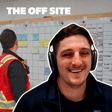Become a Creator today!Start creating today - Share your story with the world!
Start for free
00:00:00
00:00:01

Are Site Records Tanking Project Productivity?
On this week's episode, Jason and Carlos lock horns over the topic of site records, allocation sheets and whether the benefits they bring outweigh the productivity setbacks they incur.
The duo debate the positives of keeping site records, who should really be the one to keep site records, as well as how this information could be gathered in order to benefit everyone.
Follow Carlos on Linkedin | Follow Jason on Linkedin | Check out Aphex
Transcript
Introduction and Greetings
00:00:00
Speaker
I'm not going to like prejudice which side we're on but yeah the process kind of I think bogs is I think I've already I lasted two minutes before I gave away my opinion uh some people think the process
00:00:19
Speaker
You're listening to the Offsite Podcast with Jason and Carlos, where we talk all things construction and technology. Join us for discussions with industry leaders and insights into latest trends in construction.
00:00:33
Speaker
Welcome back to the Offsite Podcast. Jason, how are you, mate? Good, Carlos. Lovely to be chatting again, and welcome back to the podcast yourself the second week
Life Updates: Sleep, Steps, and Pets
00:00:43
Speaker
back. What's the Fitbit saying sleep patterns are like for you? Oh, mate, I have not had a Fitbit on my wrist because I don't want to know. It's probably danger levels. Just on my step count.
00:00:57
Speaker
Yeah, those stepcans are right. I'm 12,000 a day average. That's actually not bad. I'm trying to put the baby to sleep. But no, we have a fucking puppy as well. So yeah, we're managing both, which is a nightmare. No, yeah, it's been good. I'd say the tiredness is actually okay. I'd say it's like the mental fatigue because you're either working or baby. You don't have like real downtime where you can sort of lie on the sofa and stay at the ceiling for four hours.
00:01:24
Speaker
Yeah, with a two-year-old, I can tell you that there is light at the end of the tunnel. There's plenty of downtime in, like, if you just fast forward maybe 18 years or so, there's some downtime coming your way. Nice, looking forward to it. Yeah, it's pretty tasty.
Controversy in Construction Documentation
00:01:40
Speaker
Right, so today we've got a, I guess we've got a pretty controversial or maybe like in the weeds topic on the docket to give it some setup and background.
00:01:53
Speaker
We'll talk about record keeping on site. It's a topic that we have talked a lot about. We kind of sparked the conversation off the back of a podcast right at the start of this season with Will from Gather, and then we've had lots of conversations internally and even with customers. So site diaries, allocation sheets, tracking, labor, plant, and material, it's a crucial part of
00:02:17
Speaker
construction records, but I'd say opinions on it vary a lot.
Is Detailed Documentation Necessary?
00:02:22
Speaker
In places like the UK, things like allocation sheets where the labour plant materials and stuff are tracked are often mandated by contracts or even in things like the NEC they're strongly encouraged.
00:02:37
Speaker
And the goal is pushing for things to be more transparent to have objective records and accountability. But I guess the question is, does that level documentation really helping us as an industry or is it just more red tape and paperwork? So on the flip side, some people would say that this kind of meticulous or detailed record keeping is like good project management is avoiding disputes.
00:03:00
Speaker
Some people would argue that we should be doing even more of it. They're like the standard at the moment should be even further in the documentation side. On the flip side, others are probably thinking in inverted commas. I'm not going to like prejudice, which side we're on. But yeah, the process kind of, I think Boggs is, I think I've already, I lasted two minutes before I gave away my opinion. Some people think the process can always down.
00:03:31
Speaker
Okay, I just might as well drop the veil. Like the process is bogsy, industry down, it leads to inefficiencies and it keeps increasing or adding to this problem of poor productivity in the industry. And they believe, not me, they believe it's time to maybe rethink the approach entirely.
00:03:48
Speaker
So in this episode and today, what we wanted to do is tackle this kind of discussion head on with really the question being, is the detailed manual tracking by frontline leaders, engineers, construction managers, product supervisors, a necessity?
00:04:06
Speaker
Or is it an outdated practice that needs a rethink? I've kind of maybe given my perspective. So it'd only be fair if I hand to you, mate, and see what you're thinking on the topic is.
The Role of Records in Construction Transparency
00:04:21
Speaker
I love it when we take the gloves off and have one of the controversial chats without a guest in the room to try and be polite in front of. I'm arguing about record keeping with a QS. I think I've got the biggest uphill battle I've ever
00:04:36
Speaker
Yeah, the idea that there's a debate that it's needed or necessary is wild for me. It's a record of events. It's data that without it, we don't know anything about productivity. It's not the classic. It's this thing that you keep in a box to avoid claims in order to manage or help with sort of claims disputes in the future.
00:04:58
Speaker
It's constantly to substantiate cost, whether you're self-delivering or you're subcontracting your work. So for me, there's definitely no question on whether it's needed or not, or the importance of it, which we can come back to, because I know you've exposed your view on that. Obviously, it's not been done traditionally in a very useful way. But I think if we think about our audience, I'd quite like to just wind back. And I'm going to ask you to imagine your site engineer again.
00:05:25
Speaker
What's that, 30, 40 years ago, whenever that was? Yeah, back when I had even less facial hair.
00:05:32
Speaker
Yeah, so if you could try and imagine you're a site engineer and you don't know anything that you know now and you're not walked. I'm still at the same level, some people would say. No PTSD for doing things for 10 years, you're a fresh site engineer. Firstly, so you produced a daily site diary or an allocation? I was supposed to, yeah, I was supposed to.
00:05:56
Speaker
Okay and what's the reality of when you produced them? Was it like you on Friday you did the week at the end of the month you did a month or were you kind of okay? Do you want to know the truth or what I did? I would do truth yeah this is the truth. Your boss isn't listening who was it? I used to do a physical diet so I would do things that add value to my day so as an engineer I'd keep a record of things that I thought were important as a record out of a physical diet if you just wait one moment.
00:06:24
Speaker
That's my site dive. That's a 2012 site dive. I can open to any day in that and see what happened on that day. 7th of August 2012, we had a meeting about the pile cutting at 9 AM. We got the okay for pouring concrete on night shift that night and there was a problem with dredging at 1.30 and a bunch of notes like that. Things that I thought were important on the day that I wrote down my book because the book came everywhere with me.
00:06:53
Speaker
what we were supposed to do. Yeah. Yeah. No, go ahead. I was going to say those sort of comments are kind of like, uh, if someone says, why did you pour that night? You go, well, actually we agreed in this meeting at this time that that was the right thing to do or the plan. Yeah. We, we were recently, I was recently talking to a, like a superintendent on a project in Sydney and, and the phrase he uses like exceptional things. So things that they want to remember about the day that were
00:07:17
Speaker
out of the ordinary, important, some, you know, you just have the, you know, you have the meeting where someone says you can't do something. You feel like I'm probably going to need to record that somewhere. Okay, fine. So I'd write that in there, because that would be super useful. Because, you know, three weeks later, I might get an email from a planner saying, when did you pour this thing, or I might get a call from the cost manager saying, do we know when we got the okay on, you know, whatever to do something.
00:07:45
Speaker
What we were supposed to do is use, this is a long time ago, you used to use a system called Lotus Notes via IBM to, one of the things that you could do in there was write diaries. And you have to go in and write like a detailed diary. And I think you had to record like, you could record like who was on site and those sorts of things. But I don't think the engineers on that project needed to.
00:08:05
Speaker
And
Manual Tracking: Challenges and Solutions
00:08:06
Speaker
you're supposed to submit one of those every day and they were to go on this central system that everyone had access to. And I never did it. And occasionally like a project manager once every three months would send an email saying, no one's done any diaries. It's part of your job description. Do you do your diaries?
00:08:23
Speaker
Yeah, so that's what we used to do. And then, yeah, no one ever, no one really ever did them. OK. And then in theory, let's just assume a good day when you actually did do it and you did your allocation, your labor part material's part. Is it then reviewed and signed off by a senior agent or a PM? Yeah, on that job and a lot of jobs in Australia, that allocation thing's not done by, that's separate to the site diary to a degree. That gets done by usually a supervisor or a foreman. So they'll record hours.
00:08:52
Speaker
And oftentimes they'll record those hours because it links to payment of the workforce. So that would typically be done in another thing. So back then it was probably just the spreadsheet or a piece of paper that they wrote it down because computers were fairly new back in 2012. So they would write it on a piece of paper or in a spreadsheet and then that would then go into a payroll or a log that linked to what someone got paid.
00:09:21
Speaker
Okay, so unless there's some massive issue on the project later, is it safe to say at that point you didn't use that document again?
00:09:28
Speaker
the hours you gave on like what actually you did that day but like the hours and the plan and everything like that is that something that you produced and then for you it wasn't a useful document from that point on as a as a site engineer at the time no it wasn't useful as a project we would use it for uh if we got delayed five hours substantiating you know how many hours of how many people were on site or whatever
00:09:52
Speaker
And at any point in that, did you check what you had against what was allowed for in like an estimate or a budget? Not a daily basis on. Yeah. So typically that would be part of a forecasting process. So on projects, again, this is a very Australian approach to it. There's a forecasting cycle that usually is monthly. And what you're doing is building up a forecast of what a specific cost code looks like to complete.
00:10:19
Speaker
And then every month you're getting a stream of all the costs that have landed in the cost code, which could be from those allocation sheets or supervisors' diaries, as we'd call them. And then that lands in an engineer's cost code for forecasting. You've got your costs to date, and then you've got to rebasign your costs to complete, which I'm describing a process that you would do every week or month as a quantity for that.
00:10:42
Speaker
You've just described a bunch of valuable and useful outcomes from a diary. So we have to flip it on its head. Which aspect are you thinking is not required or is unnecessary or is it purely who's doing it? So the need to track who's worked what hours and what pieces of equipment have worked what hours and what to pay people and that sort of thing, obviously important. It's a critical record of the project.
00:11:10
Speaker
The thing that, uh, there's two parts to the thing that makes no sense to me is one is why, you know, we've had this conversation in the past on different topics where engineers and supervisors are like the most overworked folks on a construction project. Every new form, every new process, every room requirement lands on one of their desks to handle. They're the only people that really can translate from back office to front office. You know, what's happening?
00:11:36
Speaker
It seems crazy to me that this kind of mundane monotonous process is being pushed or is still pushed to that person. And it's even more, so I guess, yeah, like thought one is any team making core frontline leaders do monotonous and extensive data entry are probably burning money. The second is oftentimes on projects that process
00:12:04
Speaker
is a duplicate, a much more accurate record. So I'll give you an example. You know, you cast your mind back to the last project that you might've worked on. You would have had these, presuming they would have had allocation sheets that someone was filling in, maybe a maybe an engineer, but I'm presuming there was some gate entry system that's recording when people enter the gate and leave the gate.
00:12:29
Speaker
I was on a project and the actual number of guys working, sorry, the actual number of people working on a daily basis, averaged 50% of the number of heads that were swiped in each day. Totally. Yeah. And so I guess that comes to the point of, that comes to the point of like, if there's a problem, we give a job to a supervisor or engineer. And instead of solving the right problem, which is
00:12:57
Speaker
Yeah. Why aren't we completing this and making the system better so that people that are on site are recorded on site and people that are not on site are recorded not on site. Because the system is very simple really. Someone turns up and does work. They typically are paid by the hour. And so the cost to the contractor usually closely reflects the pay that they're going to get
00:13:23
Speaker
in their pay packet.
Technology as a Documentation Tool
00:13:25
Speaker
And so there should just be one unambiguous record of who was on site for how long. And that's the record. And the thing that happens is people have, we've got this record, we don't really trust the record. So what we'll do is we'll get someone to sit down and write the record, which could be equally as untrustworthy, because it's just someone trying to sit down and remember who was on. What time did Bob come in today? I don't know.
00:13:49
Speaker
I totally get the idea of writing a record. It doesn't matter who it is and what role they are, it's not going to be 100% accurate or complete. The part which is who should do it, I'm not sure who, if you take it away from, let's say, a supervisor, a foreman, or a site engineer, I don't know who is close enough to the detail to do it accurately. So if you are going for manual records, there's no way a QS should do it, because they don't have a clue what's going on on site.
00:14:17
Speaker
So that doesn't seem right. But if we had a means to collect the data, a QS can process it and allocate it. That feels like it's their responsibility because it's a record that's largely for them. Even that statement of it's largely for them. It shouldn't be because like an engineer should know every day how productive they are in a gang to know if they need more resource, less resource. Yeah, everyone. Everyone, yeah.
00:14:41
Speaker
And it comes back to, yeah, you're right. As a former engineer, I wouldn't begrudge the commercial team. If we can't trust the record of who was on site, then yeah, for sure. I can't do it as the commercial team. I need the engineer or someone to do it. But that doesn't mean it's the right answer.
00:15:03
Speaker
If the project manager is the only one that knows how to design a lift plan, that doesn't mean that the project manager should design all the lift plans. Like I said, I think the system is super simple. If you're on site and you want to get paid, you've got the hours. Someone approves those hours. There's systems that do this more rigorously nowadays.
00:15:25
Speaker
And so I guess my first point of it is that the history of people doing it manually to overcome either the lack of technology or the inconsistency or some of the gaps in the technology, I understand the history of it. I think as time has gone on and projects got more complicated and whatever,
00:15:45
Speaker
The fact that we're still getting those people to do it is causing and contributing to the lack of productivity. So I see the reasons why we're here, but I think the whole thing should get flipped on its head. I asked yesterday a project manager and a commercial manager why they thought or what the most important reason is that we keep a diary. The actual research is podcast.
00:16:06
Speaker
Yeah, yeah, yeah. WhatsApp's an awesome tool. The project manager just said straight back, how else do we know what happened? First statement, it is actually the only real record. I know the last five to 10 years is going to be all sorts of things that capture stuff, but like really, most people are still on sort of diaries like that. And the commercial manager said you'll never be able to improve expenditure without it. So they both sort of double down on the sort of the value that we've just gone through.
00:16:35
Speaker
I think the issue that seems just now getting, we had it back when I was on a project where they went, right, people are just swiping in and sitting in the canteen for three hours in the morning, which made it awful for trying to use those swipe records at all. So they then put a second barrier on the actual entrance to site and then they tried to put barriers for entrance to a floor so you could get, you could narrow down that pool of people and how long they're there for. And to be clear, that problem has always existed.
00:17:05
Speaker
I worked on projects where we would hear stories in the morning about Fred that slept in the stores all night and hid during the night shift. The supervisor didn't know and put them down for 10 hours on double time. But then if we leap forward, you've got new technology that would track people based on sensors, cameras, chip in your hat or your helmet.
Balancing Technology and Privacy Concerns
00:17:31
Speaker
your mobile phone, there's lots of them, there's lots of them just like you get when you turn up on site, you just geofence the site. When you turn up when your phone enters that area, it says do you want to clock on for your shift? Yeah. Okay, clock in the hours when you leave. But there seems to be a lot of pushback and backlash around people being tracked and it being too harsh on sort of productivity and how quickly they're working and then the argument they used to
00:17:55
Speaker
Further that is, well, then it's unsafe if you're pushing us too hard. So then I don't think they know what the sweet spot is in the middle at the moment. And the result of that is the frontline leaders are doing more like really monotonous low value data entry.
00:18:12
Speaker
Yeah, so we've got the wrong individuals spending too much time producing something that doesn't benefit them largely. It should benefit them. Like if you've got this, like you said, I am totally a believer that the data, the records aren't for a QS or a commercial team. As an engineer, I want to know what did we spend today? I want to be able to show the supervisor what did we spend today? Did we get value for money on what we produce versus what we spent?
00:18:34
Speaker
you know, even in the way that we do those records now, if they're going into a spreadsheet, that output ain't coming out until the end of the week or month or when someone decides to put it into a chart or whatever. And like, to be clear, this is what I'm pitching is nothing that our, like our software does. So I'm not even, I'm not pitching. Anyway, there's everything.
00:18:56
Speaker
Yeah, no, no, but like, so I just, I guess my point being is if you were to design, if you're a project manager, if you were to design a process from the ground up on a brand new project, my point is I'd be doing everything I could humanly do to alleviate the need for those records to be manually created by supervisors or engineers.
00:19:20
Speaker
No, I 100% agree on that. They're definitely stuck in a cycle based on what they have.
00:19:30
Speaker
I think just to then push it even further into maybe an area of discussion, there's these two workflows that are kind of side by side, and we've kind of talked about them interchangeably. So if you remember when you asked me questions before I talked about what I did in my book, writing down exceptional things that have happened, things I need to know, things I need to recall, and you might class that as like an engineer's side diary.
00:19:55
Speaker
Separately, you've got this allocation sheet. Many systems treat them as a peer of each other that go together. They're inextricably linked. If you look at a lot of templates that customers of ours would show us of their diaries, they're in the same document. You've got a bit for the diary and you've got a bit for the allocation sheet piece.
00:20:16
Speaker
And lots of systems do the same. Which is super odd, considering the purpose of each side of it. And I guess it's just a symptom of, well, this person's doing it, let's put it in one, presumably. Okay, I thought you would disagree with me. Yeah, I think they're totally separate. I think they're totally separate. There's always expect of you to go, no, that's wrong. Yeah, no. Yeah, we should do them together.
00:20:38
Speaker
Yeah, I think that even in the example that I gave, two different people did them. And I think in often cases, two different people might do them. So I guess I would then advocate for, if I was building the system from scratch,
00:20:53
Speaker
that those things aren't tied together because the frontline leaders do need to do the diary because they're the one that were there when someone got told we couldn't pour concrete. You need their take on the day recorded as a record.
00:21:09
Speaker
And even that process, I think I would reimagine, but I'm probably going too much into like a product discussion at that point. But I think like they should just be able to make those contributions as they go along through the day. It shouldn't be this big ordeal at the end of the day where they've got to strap, you know, someone's got to strap them to a desk and say, write it all down.
00:21:30
Speaker
But yeah, I would totally separate allocation sheets from a diary and then put a lot of pressure on automatically capturing what would have typically gone into that allocation sheet. Yeah, and the allocation sheet, it's the most obvious sort of technology that can help you populate that in a fairly accurate
Towards Automated Data Collection
00:21:48
Speaker
way. The thing that blows my mind from the idea of keeping those two things together on an individual's diary is
00:21:57
Speaker
Who the hell's in the background adding up the numbers from everyone's diaries? Because they could be overlapped and overlapped and overlapped and add up to something wild compared to how much resource you have on site or how much kit you have. Yeah. That equals the horrible issue of like it's like producing a forecast and everyone does their own.
00:22:15
Speaker
Well, what I've seen people what I've seen people do is they start to like merge the diaries together. So you'll get like an area diary for, you know, six supervisors and 12 engineers or four engineers, and they all do this diary together. And the thing becomes like, you know, every day, there's like a there's like a curating of a version of war and peace and like,
00:22:36
Speaker
what happened. Yeah, it does feel like, and you're right, like who's going to add them up? I think that there are lots of systems, like as I said, a lot of systems do this thing where they put the allocation sheet and direct together. And if you fill it all out, yeah, it can do the adding up for you. But it's done.
00:22:54
Speaker
Yes, well, it goes back to all that's doing is saving an admin person time. What gets me really excited of saving the frontline leader time and that person hasn't that person's evolution over the last 15 years is writing everything in a piece of paper to writing everything on their computer.
00:23:12
Speaker
You know, it's probably even slower, to be honest, because, you know, probably a terrible user experience. So I love how you say I'm an admin person. Like we just had like admin people. Are you talking about a QS? No, in Australia, we have admin people that we like site administrators, which would be probably like a junior QS would be probably the closest.
00:23:34
Speaker
So I guess the job of adding up all the spreadsheets into one spreadsheet and then asking the supervisor, hey, we, you know, build a steel fixer worked allegedly 43 hours a stay because they're on five diaries. What's correct? That's a good use of time. Cost saving. Yeah, so are we in agreement?
00:23:56
Speaker
We're in agreement of the principle that an individual should not be in charge of those two aspects. We're in agreement that the front lines like senior staff should be providing the narrative or the sort of take of the day because it's important to capture that. We're in agreement that that shouldn't be done at the end of the day. Now write a paragraph about your day like a kid's diary.
00:24:20
Speaker
And we're in agreement that the data should be collected, aggregated and it should do everything else automatically and tie it to budget, broadcasting and productivity and warnings going off saying you spent twice as much today than you planned to. Yeah, I think we actually are in agreement.
00:24:37
Speaker
I'd get I'd even go further. So yeah, I think we're in agreement. I think instead of treating the person writing though, that frontline leader is like the only way that we get information, which is where I'd say a lot of people are at the moment, and making them the bottleneck to capturing that information. I think we should have a system that team that treats them as like one of the inputs. So they might provide some input, but there are these other inputs.
00:25:02
Speaker
And maybe they snap a photo on site of an issue or something, but maybe they don't need to because we also have site cameras feeding in as an input. Maybe they make notes about a meeting that happened on site that day, but maybe we don't need to because it's also recorded and automatically transcribed and attached to the day.
00:25:25
Speaker
Like we have call recorders in every call that we're in, right? Maybe they make a voice note on the day saying that they got 20 meters of pipe laid today, but maybe they don't need to because it comes from a drone survey and that's another input. And maybe they even take a photo of my physical notebook from 2012 with like the names of people that didn't turn up on site today as a record, but then maybe they don't need to because it's automatically recorded from the access system.
00:25:55
Speaker
So I think that I would pull everything apart and say, those folks on site that are the most important people for driving the outcome of the project, let's not treat them as the only source of information about what happened every day and build a system that lets them add the value that only they know about and automatically captures as much as possible in this system.
00:26:18
Speaker
Yeah, you're really pooling the knowledge of everyone then to produce something pretty accurate. And automatically capturing as much as possible. We see it in what we use. When we're trying to talk to a potential customer, we've got inputs coming from all these different sources. Conversations, phone calls, emails, website traffic.
00:26:40
Speaker
Yeah. And it's not, it's not getting you or one of the sales team to sit down and write a narrative every day of today. I did this and then this person called me and then that's just crazy. Right. Sounds like HubSpot.
00:26:57
Speaker
Okay, cool. Unless you've got any other more things we can disagree on, we might wrap it there because I'm looking at the clock.
Conclusion and Listener Engagement
00:27:07
Speaker
Cool. So I think for those listening, thank you obviously for listening and for feedbacking and sending us messages. We are
00:27:16
Speaker
Super keen always to hear what people find valuable and interesting to cover as a topic and in terms of the way that we cover them, like guess, no guess, this type of discussion. Anyone that takes the time to write in, we would definitely value it. Anyone that messages us and sends us, you know, what about this topic or that, we really value it and thank you for that. And yeah, thank you very much for listening. Thank you very much. Thanks, guys.



















